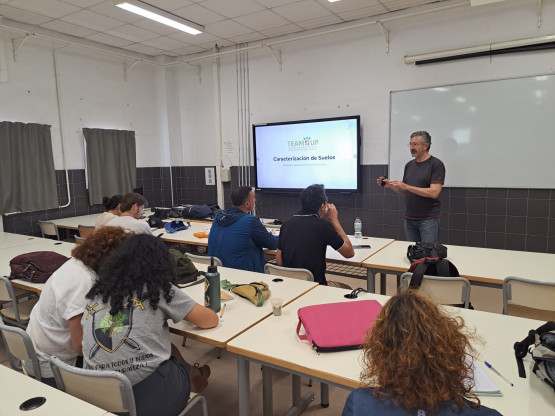29 May 2025 | By Juan Román Patiño
As part of the TEAM#UP project and in line with our ongoing commitment to educational innovation and sustainable development, IES El Palmeral has successfully delivered a two-day program of advanced content focused on ecological restoration. This initiative, facilitated through co-teaching and interdisciplinary collaboration, reflects our mission to equip students with the skills and knowledge needed to address pressing environmental challenges.

Held on Monday 26 and Tuesday 27 May, the sessions brought together leading experts who shared their insights on critical topics central to the restoration and resilience of degraded ecosystems. The following distinguished professionals contributed to this milestone:
-
Jordi Cortina (University of Alicante) presented a comprehensive analysis of soil characterisation, detailing the key parameters that influence soil health—a foundational component in ecological restoration. His presentation emphasized how restoring soil quality supports vegetation recovery and enhances ecosystem functions.
-
Antonio Guillén (Biocyma) delivered a detailed overview of forest inventory techniques and carbon balance assessments. He underscored the pivotal role of sustainable forest management in mitigating climate change and restoring degraded landscapes, particularly through afforestation and reforestation efforts.
-
Pablo Ascasibar (Agresta S. Coop.) introduced participants to the integration of digital technologies—such as remote sensing, drones, QGIS, LiDAR, and GNSS—for the monitoring and assessment of ecosystems. These tools are increasingly indispensable in large-scale ecological restoration projects, enabling precision planning and ongoing evaluation of restoration outcomes.
-
Juan Román Patiño (IES El Palmeral) conducted a hands-on workshop on the creation of immersive 360° virtual tours using the Lumi H5P tool. This innovative method enhances environmental education by allowing students and the public to explore restored ecosystems virtually, fostering greater awareness and appreciation of restoration work.
Through the lens of ecological restoration, these sessions promoted a holistic understanding of how degraded ecosystems can be revitalized using scientific knowledge, digital tools, and sustainable practices. The co-teaching approach facilitated cross-disciplinary learning, reinforcing the importance of collaboration across environmental science, technology, and education.

This initiative strengthens the academic foundation of our students while also preparing them to contribute meaningfully to global restoration efforts, such as those outlined in the UN Decade on Ecosystem Restoration (2021–2030). By integrating advanced methodologies and real-world applications, we aim to inspire a new generation of professionals committed to the recovery of ecosystems and the preservation of biodiversity.
The successful completion of this program highlights IES El Palmeral’s ongoing commitment to academic excellence, environmental stewardship, and the advancement of innovative teaching strategies within the framework of ecological restoration.
